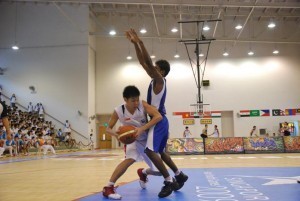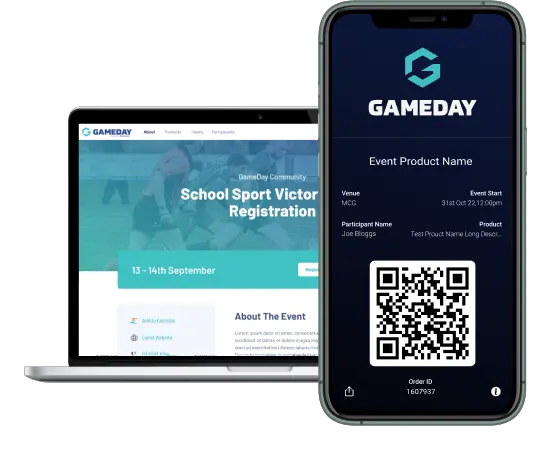FIBA 33 Basics
FIBA 33 is a formalized version of three-on-three basketball, a form of the game initially developed on inner-city asphalt outdoor courts in the United States. This variant of the sport is currently being promoted by the sport's worldwide governing body, FIBA, which began developing it in 2007. The format was first tested at the 2007 Asian Indoor Games in Macau,[1] introduced at international level at the 2009 Asian Youth Games in Singapore, and made its worldwide competitive debut at the 2010 Youth Olympics, also in Singapore.[2]
|
|
Basic rules
FIBA released its official rules for FIBA 33 on June 2, 2010 as a supplement to its official basketball rules. The rules state that regular FIBA rules apply to all situations not specifically addressed in the FIBA 33 rules
The departures from regular full-court basketball are as follows:[3]
- Each team consists of four players, of whom three are on the court at any given time, plus one coach.
- The game is played on half of a FIBA regulation court, with one basket.
- A jump ball is not used to start the game. Instead, immediately before the game, a player from one team attempts a three-point shot. If made, the shooter's team will have first possession. Subsequent jump ball situations are governed by the alternating possession rule, with the first such possession going to the team that did not have possession of the ball at the start of the game.
- Instead of the three officials used in full-court basketball, one official is used, plus a scorer, a timer, and a shot clock operator.
- The game is divided into two periods of 5 minutes (12 Minutes non stop the clock) each. The winner is the first team to score 33 or more points. If neither team reaches 33 points at the end of regulation, the team with the highest score wins, as in regular basketball. A tie in regulation leads to as many overtimes of 2 minutes as are needed to produce a winner, either by one team being ahead at the end of an overtime or by a team reaching 33 points.
- A 10-second shot clock is used.
- The first person on the offensive team to possess the ball outside the three-point arc must pass the ball to a teammate before a shot can be taken.
- If the defense gains possession of the ball within the two-point area, either by a steal or rebound, the team must first move the ball behind the three-point arc and then pass the ball before being allowed to take a shot.
- Throw-ins take place at a point on the sidelines level with the top of the three-point arc. The thrower may pass to a teammate anywhere on the court. The receiver is not allowed to shoot regardless of his or her location. If in the three-point area, the receiver must pass to a teammate. If in the two-point area, the ball must be dribbled or passed outside the area; once outside the area, the player in possession must pass before the team can attempt a shot.
- Dunking is not permitted unless the court has approved breakaway rims.
- No timeouts are allowed at any time. (The officials may still stop the game in case of player injury or other dangerous situation, as in the standard FIBA rules.)
Some similarities to traditional basketball rules are explicitly addressed in the FIBA 33 rules:
- A player who has committed 5 fouls is disqualified, as in a full-length fullcourt game.
- A team is in a penalty foul situation on its fourth foul in a period, as in the full game. Subsequent non-shooting defensive fouls by that team result in two free throws. Since the main FIBA rules apply unless specifically addressed in the FIBA 33 rules, all overtime periods are considered an extension of the second period for purposes of the foul penalty.
FIBA Secretary General Patrick Baumann has stated that the rules are a work in progress, but that any changes will not compromise the spirit of street 3-on-3.[2] One change from the original rules was in the number of periods; in the first test event, games were conducted in three 5-minute periods.[1]
Development
The FIBA 33 concept was first developed in 2007, with a demonstration competition held in November of that year at the Asian Indoor Games in Macau. Further test events were held in April 2008 in the Dominican Republic and October 2008 in Indonesia.[1] FIBA 33 was later contested at the 2009 Asian Youth Games[1] by 19 teams in the boys' tournament and 16 teams in the girls' tournament. All games were held at Anglican High School, Singapore[2]. FIBA 33 basketball was the only form of basketball at the 2010 Summer Youth Olympics, contested by 20 teams each in the boys' and girls' tournaments. The tournaments were held at the *scape Youth Space, Singapore.
According to Baumann, enthusiasm for the FIBA 33 format in China is "beyond any imagination", and FIBA 33 tournaments are held "almost every week" in Southeast Asia. [2]
FIBA is also developing a world ranking system for FIBA 33 in consultation with technology companies, as well as statistics professors from a university in FIBA's headquarters country of Switzerland. Because FIBA 33, as a truncated version of the full game of basketball, has an obvious parallel in beach volleyball, a two-person outdoor variant of volleyball, FIBA is in regular contact with volleyball's governing body, FIVB, to learn about the development of beach volleyball since that discipline's debut at the 1996 Olympics.[2]
FIBA sees FIBA 33 as a major vehicle for promotion of the game throughout the world. As Baumann stated in 2008, "The 3-on-3 concept has all the elements and skills required for basketball, it has inspired and will continue to inspire many great players in the future. At the same time, it is the easiest and one of the most effective ways to bring youngsters to basketball, keep them and promote our game. Finally, FIBA 33 can and will promote key educational and social values to the next generations."[1] Baumann is also hoping that FIBA 33 will be adopted for the Summer Olympics as early as 2020











Comments
Comment Guidelines: The SportsTG Network is made up of players, families and passionate sports followers like you who have a strong opinion about sport. That's great - we want you to have your say and share your thoughts with the world. However, we have a few rules that you must follow to keep it fun for all. Please don't be rude, abusive, swear or vilify others. Apart from some pretty serious sport sanctions, we also can ban you and report you if things get out of hand. So play fair and have fun, and thanks for your contribution.